The phrase “Since vs Sense: When to Use Each Word” refers to understanding the difference between two commonly confused English terms that sound alike but serve entirely different purposes. “Since” is primarily used to indicate time or reason, often acting as a conjunction, preposition, or adverb. On the other hand, “sense” relates to perception, understanding, or meaning, functioning as both a noun and a verb. Knowing when and how to use each word correctly ensures your writing remains clear, precise, and impactful.
Mastering the subtle differences between similar-sounding words is a game-changer in communication. It elevates your writing and helps you avoid common errors that could confuse your readers or dilute your message. With just a few easy-to-follow rules and examples, you can gain confidence in distinguishing the correct usage, even when these words appear tricky.
Whether you’re drafting emails, essays, or social posts, getting a solid grip on “Since vs Sense: When to Use Each Word” boosts your grammar game. This simple but essential skill is key to making your writing polished and professional. Let’s explore how to use them effortlessly and with purpose.
Ready to master these tricky terms once and for all? Let’s dive into the world of since vs sense when to use each word and transform your writing and speaking skills.
The Origins and Etymology
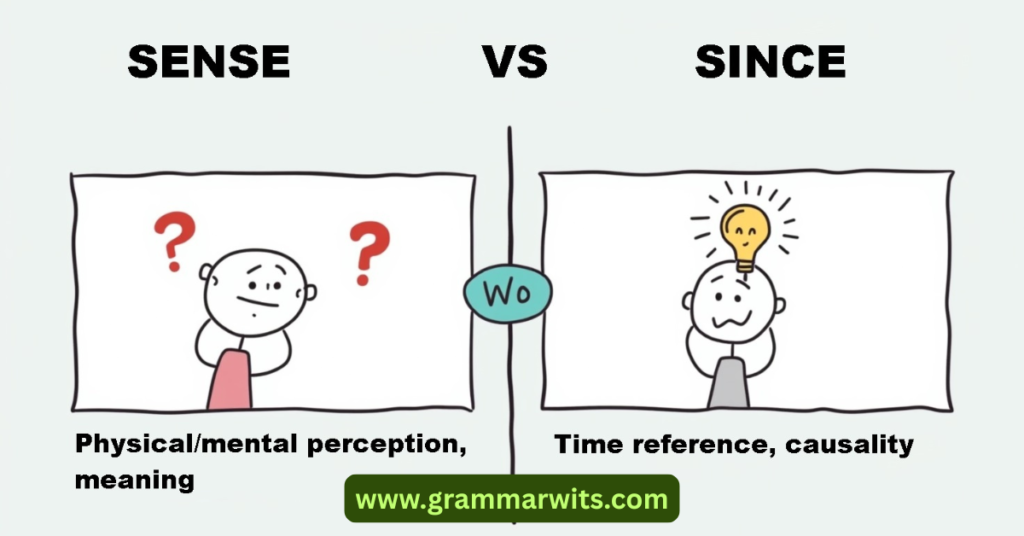
Understanding the roots of since vs sense when to use each word helps clarify their distinct meanings and uses. These words evolved from completely separate linguistic ancestors.
The word “since” traces back to Old English “siþþan,” a combination of “sið” (after) and “þan” (then). Over time, through Middle English, it morphed into “sithen” and eventually the “since” we use today. This etymology explains why “since” primarily relates to time sequences and causality.
Meanwhile, “sense” derives from Latin “sensus,” meaning “feeling, perception, understanding,” which came from the verb “sentire” (to feel). The Latin root explains why “sense” connects to both physical sensation and mental comprehension.
“Words have their histories, and tracking them illuminates why we use them as we do today.” – David Crystal, linguist
This etymology reveals why these words, despite their similar sounds, serve completely different grammatical functions in English.
| Word | Origin | Original Meaning | Current Primary Uses |
|---|---|---|---|
| Since | Old English “siþþan” | After that time | Time reference, causality |
| Sense | Latin “sensus” | Feeling, perception | Physical/mental perception, meaning |
Mastering “Since”: A Complete Guide
When exploring since vs sense when to use each word, let’s first tackle “since.” This versatile word functions in three main ways in English: as a conjunction, a preposition, and an adverb.
As a Conjunction
As a conjunction, “since” connects clauses while indicating time or reason:
- Time reference: “I’ve been waiting since you called.” (from the time that)
- Reason clause: “Since you’re here, let’s discuss the project.” (because)
Notice how “since” creates a logical relationship between two parts of a sentence, establishing either a timeline or causality.
As a Preposition
When used as a preposition, “since” always relates to time:
- “She’s been working here since 2018.”
- “We haven’t spoken since Tuesday.”
In this role, “since” introduces a specific starting point, with the implication that something began then and continues to the present.
As an Adverb
Less commonly, “since” functions as an adverb:
- “I saw her a year ago and haven’t spoken to her since.”
- “The restaurant opened in May, and I’ve eaten there several times since.”
Here, “since” means “from then until now” without needing to repeat the time reference.
Special Usage Patterns
American and British English sometimes use “since” differently. British English more readily accepts “since” for logic and reasoning, while American English often prefers “because” for clear causality.
Common mistakes with “since” include:
- Pairing it with a simple past tense instead of perfect tenses
- Creating ambiguity between time and reason meanings
- Using it with future events (incorrect usage)
When examining since vs sense when to use each word, remember that “since” always relates to connecting points in time or establishing reasons.
“Sense” in All Its Forms
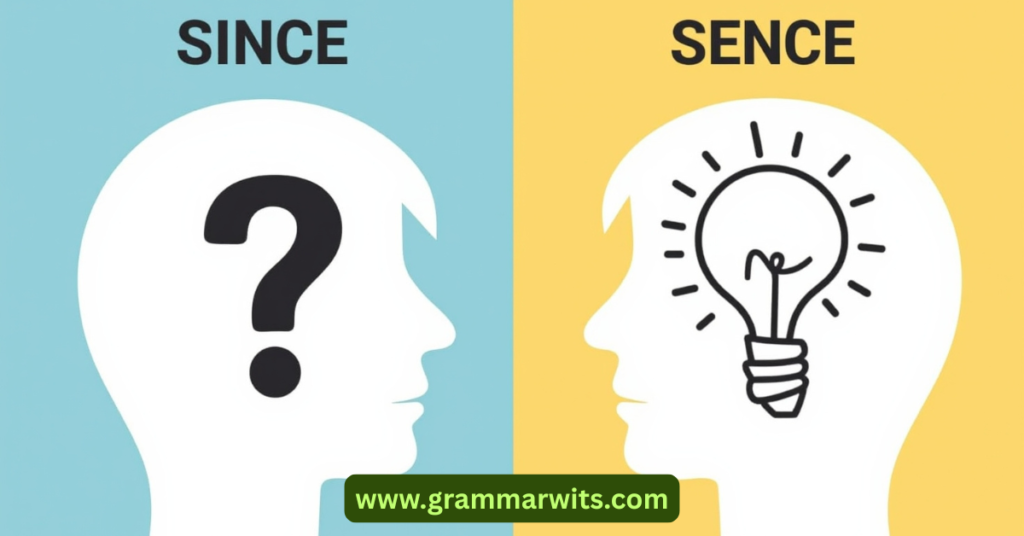
In the since vs sense comparison, “sense” proves remarkably versatile. This word primarily functions as a noun and occasionally as a verb, with numerous shades of meaning.
The Five Physical Senses (Noun)
The most concrete use of “sense” refers to our five physical perception faculties:
- “My sense of smell has weakened since the cold.”
- “Bats have an extraordinary sense of hearing.”
These represent our body’s detection systems for interacting with the external world.
Emotional Impressions and Intuition
“Sense” also describes feelings and intuitive knowledge:
- “I had a sense of foreboding when I entered the room.”
- “Her sense of justice was deeply offended by the ruling.”
This usage relates to internal awareness and intuition rather than physical sensation.
Logical Meaning and Rationality
Perhaps most commonly, “sense” refers to logical understanding:
- “That explanation makes sense to me now.”
- “There’s no sense in arguing about this further.”
This usage connects to comprehension and rationality—the ability to understand meaning and logic.
“Sense” as a Verb
As a verb, “sense” means to detect or understand something:
- “Dogs can sense fear in humans.”
- “I sensed he wasn’t telling the whole truth.”
This verbal form relates to perceiving or becoming aware of something, either physically or intuitively.
Idiomatic Expressions with “Sense”
English features numerous idioms using “sense”:
- “Come to your senses” (become reasonable)
- “A sense of humor” (ability to appreciate comedy)
- “Talking sense” (speaking reasonably)
- “In a sense” (from one perspective)
Understanding these expressions is crucial when studying since vs sense when to use each word, as they appear frequently in everyday English.
Distinguishing Between “Since” and “Sense”
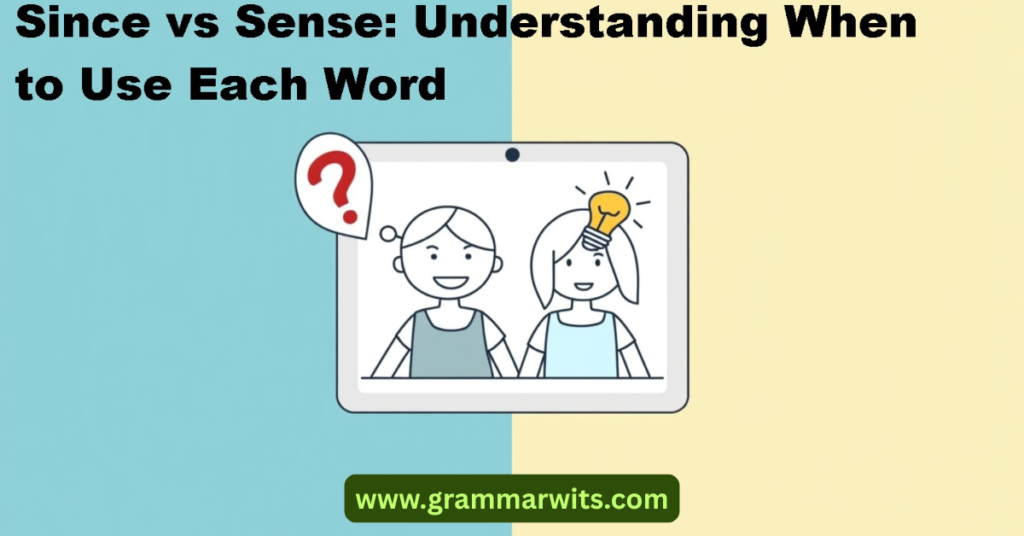
The key to mastering since vs sense when to use each word lies in understanding their distinct functions. Let’s explore practical ways to keep them straight.
Pronunciation Differences
Though subtle, pronunciation differences exist:
- “Since” typically sounds like /sɪns/ with a clear “s” sound at the end
- “Sense” sounds like /sɛns/ with more emphasis on the “n” before the final “s”
Native speakers often distinguish these words through context rather than pronunciation alone, which explains why homophones like these cause confusion.
Memory Tricks for Keeping Them Straight
Try these memory associations:
- “Since” has an “i” like “time” – both relate to when things happen
- “Sense” has an “e” like “perception” – both relate to experiencing and understanding
- “Since” begins a reason, while “sense” relates to reasoning ability
Visual learners might appreciate this trick: picture an hourglass for “since” (representing time) and a brain for “sense” (representing understanding).
Quick Reference Guide
When choosing between since vs sense when to use each word, ask yourself:
- Am I referring to time or giving a reason? → Use “since”
- Am I talking about understanding, feeling, or perception? → Use “sense”
This simple test resolves most confusion between these heterographs.
Real-World Examples: “Since” in Context
Practical examples clarify when to use since in various contexts. Let’s explore realistic applications of this versatile word.
Time-Related Examples
“Since” frequently indicates a starting point in time:
- “I’ve been studying Spanish since January.”
- “Since we moved to Chicago, we’ve experienced all four seasons.”
- “The company has grown tremendously since its founding in 2010.”
Notice that “since” typically pairs with perfect tenses (have/has been) when describing time.
Reason-Related Examples
“Since” also introduces reasons or logical consequences:
- “Since you’ve already paid, you might as well attend.”
- “I decided to walk since the weather was so nice.”
- “Since everyone agrees, let’s move forward with the plan.”
In these cases, “since” functions similarly to “because” but often feels slightly less direct.
Formal vs. Casual Usage
In formal writing, “since” for reasoning sometimes creates ambiguity:
Potentially ambiguous: “Since she left early, we canceled the meeting.” (Does this mean after she left, or because she left?)
Clearer alternatives:
- For time: “After she left early, we canceled the meeting.”
- For reason: “Because she left early, we canceled the meeting.”
In casual conversation, context usually resolves any ambiguity in since vs sense when to use each word.
Examples from Literature and Media
“Since” appears frequently in classic and contemporary writing:
“Since the dawn of time, man has yearned to destroy the sun.” – C.M. Burns, The Simpsons
“I have been bent and broken, but—I hope—into a better shape. I have been in the fire and on the anvil, I have been upon the waters since the last solstice.” – Charles Dickens, Great Expectations
These examples showcase both the temporal and causal uses of “since” in literary contexts.
Real-World Examples: “Sense” in Context

Understanding when to use sense requires seeing the word in action across its multiple meanings. The following examples demonstrate how “sense” functions in various contexts.
Examples of Physical Perception
“Sense” commonly refers to our five physical faculties:
- “Her sense of taste was affected by the medication.”
- “Athletes often develop a keen sense of balance.”
- “The perfume overwhelmed my sense of smell.”
These examples highlight “sense” as our interface with the physical world.
Examples of Understanding and Meaning
The most frequent use of “sense” relates to comprehension:
- “The instructions don’t make sense to me.”
- “There’s a common sense solution to this problem.”
- “In what sense did you mean that comment?”
When something “makes sense,” it becomes logically comprehensible.
Examples with “Sense” as a Verb
As a verb, “sense” indicates detection or awareness:
- “I could sense his disappointment despite his smile.”
- “Animals often sense danger before humans do.”
- “She sensed something was wrong as soon as she entered.”
This usage connects to intuitive or perceptive understanding.
Common Phrases and Idioms
“Sense” appears in numerous everyday expressions:
- “She talked some sense into him.” (convinced him to be reasonable)
- “I’ve finally come to my senses about that relationship.” (become rational)
- “In a sense, both viewpoints are valid.” (from a certain perspective)
- “That joke was in poor taste and showed no sense of decorum.” (understanding of propriety)
These idiomatic uses enhance our understanding of since vs sense when to use each word by showing how “sense” permeates everyday communication.
Compound Forms and Related Terms
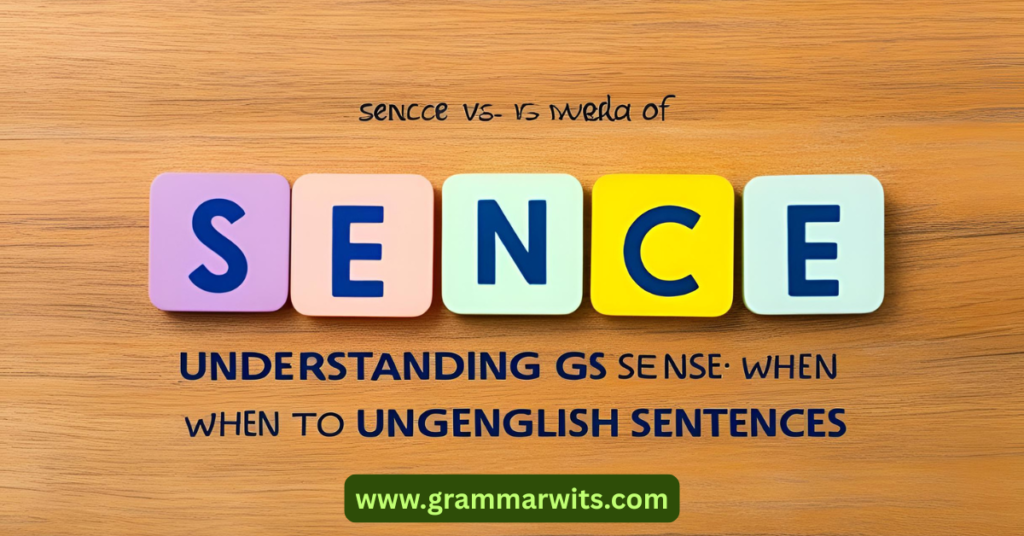
Both “since” and “sense” appear in various compound forms and related expressions, further illustrating the importance of understanding since vs sense when to use each word.
“Since When,” “Ever Since,” “Since Then”
“Since” combines with other words to create specific time expressions:
- “Since when have you been interested in jazz?” (questioning the starting point)
- “I’ve loved swimming ever since I was a child.” (emphasizing continuity)
- “We visited Paris in 2019 and have wanted to return since then.” (from that specific point)
These compounds maintain the temporal aspect of “since” while adding nuance.
“Sensible,” “Sensitive,” “Senseless”
“Sense” generates several important derivatives:
- “Sensible” (showing good judgment): “She made a sensible decision to save money.”
- “Sensitive” (easily affected): “My skin is sensitive to sunlight.”
- “Senseless” (without purpose or awareness): “It was a senseless act of violence.”
Each retains some connection to perception or understanding while developing specialized meanings.
“Common Sense,” “Sixth Sense,” “Sense of Humor”
Some of English’s most colorful expressions involve “sense”:
- “Common sense isn’t very common.” (basic good judgment)
- “She has a sixth sense about people’s intentions.” (intuition beyond the five senses)
- “His sense of humor gets him through difficult times.” (ability to appreciate comedy)
- “They have no sense of direction without GPS.” (ability to orient oneself)
These phrases show how “sense” extends from basic perception to sophisticated human faculties.
Understanding these related forms enriches your grasp of since vs sense when to use each word by showing their functional extensions in everyday language.
Practical Exercises
Let’s practice distinguishing since vs sense when to use each word with some hands-on exercises.
Fill-in-the-Blank Practice
Complete these sentences with either “since” or “sense”:
- I haven’t seen him _____ last summer.
- That doesn’t make _____ to me.
- _____ you asked, I’ll tell you the truth.
- Her _____ of style is impeccable.
- We’ve been friends _____ childhood.
Answers: 1. since, 2. sense, 3. Since, 4. sense, 5. since
Sentence Correction Challenges
Identify and fix the errors in these sentences:
- “I’ve been waiting sense morning.” (Incorrect) Correct: “I’ve been waiting since morning.”
- “It makes since to leave early.” (Incorrect) Correct: “It makes sense to leave early.”
- “She hasn’t called sense the party.” (Incorrect) Correct: “She hasn’t called since the party.”
- “He has a good since of direction.” (Incorrect) Correct: “He has a good sense of direction.”
- “Since it’s broken, there’s no since in keeping it.” (Mixed use) Correct: “Since it’s broken, there’s no sense in keeping it.”
The last example perfectly demonstrates how both words might appear in the same sentence with their distinct meanings.
Context-Based Selection Exercise
Which word fits better in each context?
Scenario 1: “_____ we last met, I’ve changed jobs.” Best choice: “Since” (indicating time)
Scenario 2: “I have a _____ that something isn’t right.” Best choice: “sense” (indicating intuition)
Scenario 3: “_____ you mentioned it, I’ve been thinking about it.” Best choice: “Since” (indicating cause)
Scenario 4: “It doesn’t make _____ to drive when we could walk.” Best choice: “sense” (indicating logic)
Regular practice with since vs sense when to use each word will strengthen your ability to choose correctly every time.
Perfect Alternatives: When to Use Substitutes
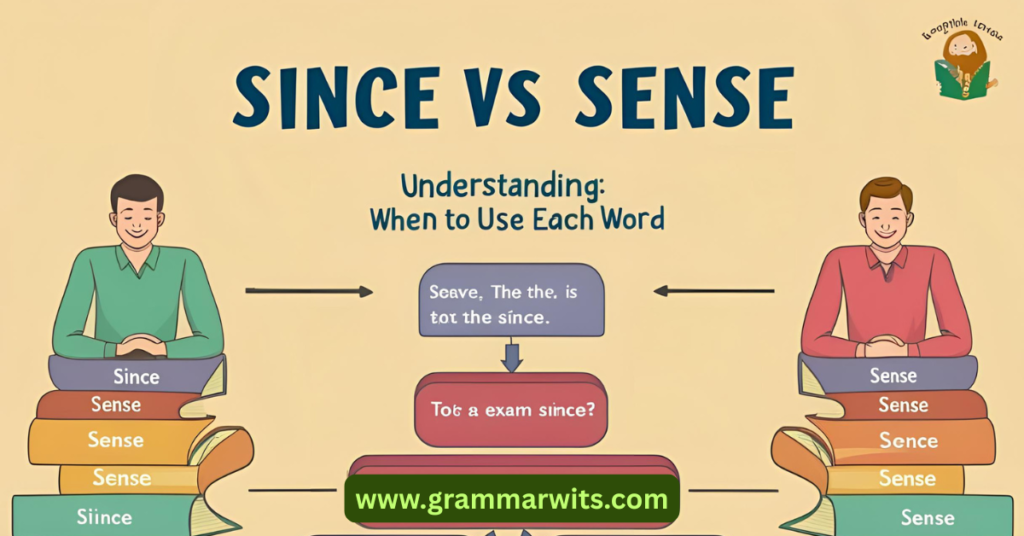
Sometimes the best way to resolve since vs sense when to use each word confusion is to use alternatives. Here are effective substitutes for each term.
Alternatives for “Since” (Time Indicators)
When indicating time, you might use:
- “From”: “I’ve been waiting from 9 AM.”
- “Ever since”: “I’ve loved baseball ever since I was a child.”
- “After”: “After the meeting, we all went to lunch.”
- “Starting from”: “Starting from tomorrow, new rules will apply.”
These alternatives can sometimes provide more precision than “since” alone.
Alternatives for “Since” (Reason Indicators)
When indicating reason, consider:
- “Because”: “Because you helped me, I’ll help you.” (more direct)
- “As”: “As you’re already here, you might as well stay.” (more formal)
- “Given that”: “Given that we’re running late, let’s take a shortcut.” (more formal)
- “Considering”: “Considering the circumstances, you did well.” (more analytical)
These alternatives can reduce ambiguity when “since” might be unclear.
Alternatives for “Sense” (Physical Perception)
Instead of “sense” for perception, try:
- “Perception”: “Her perception of color is extraordinary.”
- “Awareness”: “Dogs have a keen awareness of their surroundings.”
- “Faculty”: “The faculty of hearing diminishes with age.”
- “Detection”: “Early detection of symptoms improves outcomes.”
These alternatives often provide more specificity in scientific or medical contexts.
Alternatives for “Sense” (Understanding)
For “sense” as understanding, consider:
- “Logic”: “There’s no logic in that argument.”
- “Meaning”: “I couldn’t grasp the meaning of her explanation.”
- “Comprehension”: “His comprehension of the subject improved.”
- “Reasoning”: “Your reasoning seems flawed.”
Using these alternatives can sometimes add precision to your expression while avoiding confusion in since vs sense when to use each word scenarios.
Grammar Tips for Professional Writing
Professional contexts demand extra precision when navigating since vs sense when to use each word. Here are specialized tips for formal writing.
“Since” vs. “Because” in Formal Writing
In academic or business writing, the potential ambiguity of “since” (time vs. reason) can create problems:
Potentially unclear: “Since the policy changed, productivity has increased.” (Does this mean after the policy changed or because it changed?)
In formal contexts, many style guides recommend:
- Use “since” primarily for time relationships
- Use “because” for clear causality
- When “since” indicates reason, ensure context eliminates ambiguity
Avoiding Ambiguity with “Since”
When using “since” in professional documents:
- Pair “since” with perfect tenses when indicating time: “The company has grown since its founding.”
- Add clarifying time markers when needed: “Since January 2022, we have implemented…”
- Consider sentence structure: placing “since” at the beginning of a sentence often signals reason rather than time
Using “Sense” Precisely in Technical Contexts
In technical or specialized writing:
- Specify which sense you mean when referring to perception: “visual sense” rather than just “sense”
- Use “make sense” sparingly in formal documents; consider “is logical” or “is comprehensible” instead
- Be aware that fields like philosophy and psychology have specialized uses of “sense”
This attention to detail when handling since vs sense when to use each word demonstrates linguistic precision that readers will appreciate in professional communication.
Conclusion
Understanding the difference between Since vs Sense When to Use Each Word can make your writing much clearer. “Since” talks about time or reason, while “sense” is about feeling, understanding, or meaning. These words may sound alike, but they play very different roles. Learning how to use them correctly helps avoid confusion and mistakes.
In everyday writing, using the right word shows that you care about clear and correct communication. Mastering Since vs Sense When to Use Each Word will help you sound more professional and confident. With regular practice, it becomes easy to tell them apart. Keep this simple guide in mind, and you’ll never mix them up again.
Here’s a quick reference summary for since vs sense when to use each word:
- Use “since” when:
- Referring to a time period from a specific point to now
- Introducing a reason (similar to “because”)
- Indicating “from that time until now” as an adverb
- Use “sense” when:
- Discussing physical perception or detection
- Talking about understanding or meaning
- Referring to intuition or judgment
- Using idiomatic phrases like “make sense” or “common sense”
Remember that context typically resolves any potential confusion between these terms. With practice, distinguishing when to use since versus when to use sense will become second nature.
The next time you hesitate between these words, simply ask: “Am I referring to time/reason, or to perception/understanding?” This simple question will guide you to the correct choice nearly every time.
FAQ Section
What’s the simplest way to remember the difference between “since” and “sense”?
“Since” relates to time or reason, while “sense” relates to perception or understanding. Think: “since when?” (time) versus “sense of smell” (perception).
Is it “Makes since” or “Makes sense”?
The correct phrase is “makes sense.” This expression means something is logical or understandable. “Makes since” is always incorrect.
Can “since” and “sense” ever be interchangeable?
No, “since” and “sense” are never interchangeable. Despite similar pronunciation, they serve completely different grammatical and semantic functions.
Why do people confuse “since” and “sense” so often?
People confuse these words because they’re homophones (sound similar) in many accents, and both are common words in everyday English. The confusion represents a classic case of similar sound but different meaning.
Are there regional differences in how “since” is used?
Yes. British English more readily accepts “since” to indicate reason, while American English often prefers “because” for clear causality statements. However, both uses are understood in all English-speaking regions.
How can ESL learners master the difference?
ESL learners should:
- Practice with contextual examples
- Create memory associations (link “since” with time)
- Use the words in different sentences daily
- Pay attention to correction when speaking with native speakers
- Remember that “sense” is often used in phrases like “makes sense”
Understanding since vs sense when to use each word elevates your English proficiency and eliminates a common source of confusion in both writing and speaking.

Alizy Smith is a passionate language enthusiast and the admin of Grammar Wits. With a love for wordplay, grammar quirks, and witty expressions, she’s dedicated to making language learning fun and accessible. From grammar tips to pun-filled laughs, Alizy ensures every piece of content entertains while educating — turning tricky rules into easy, enjoyable reads.
